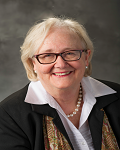
Marie T. O’Toole
Rutgers University, USA
Biography
There is no doubt that the language of health care is nuanced and can confuse as well as inform if one is not familiar with these nuances. Health care vocabularies fall into the category of a specialized language also known as a language for special purposes (LSP). Recently lexicographers are using a new term, Academic and Professional Languages. This new term refers to the type of language used by specific knowledge communities or groups of professionals, and the language of nursing best falls within this category. Academic and Professional Languages (APL) include the common language, or language that is used in all types of communication, but specific terms, or lexemes, from the common- or general language- often have a specialized meaning in an APL. There are also terms that are in a grey area between the general language and the APL that are used in both, with different meanings depending on context. Neither the broader language of health care, nor the language specific to the nursing profession, is unique as a scientific vocabulary. A large number of words in academic and professional language are derived from Latin and Greek but scientific language is supplemented by new words added as the science evolves and research adds to the body of knowledge. This presentation will highlight the language of healthcare used to describe innovations and advances in nursing and healthcare as represented in contemporary health care dictionaries.
Abstract
Abstract : The language of health care
